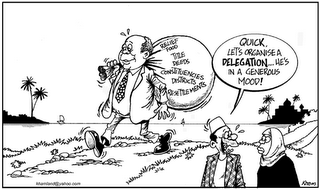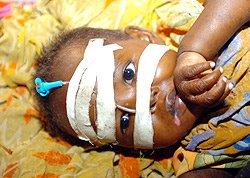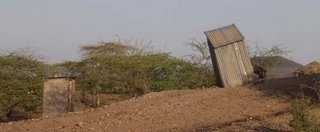Nightmare of seeking medical care in Northern KenyaFor 17 days, Khadija Ali watched her eight-month-old baby weaken from disease because there is no hospital near her home village of Dadacha Basa in Isiolo District.
Nurses at the local dispensary treated the baby, Guyat Ali Diba, after physically examining him, but he did not improve and required specialised treatment.
Two-year-old Najma Mohammed at Wajir District Hospital, where she is being treated for kalaazar and malnourishment. Unable to get a vehicle to go to the nearest health centre at Merti, about 55km away, she waited until last week, when she hitched a lift in a lorry to Isiolo town.
"He is very sick and I was afraid he would not live," Khadija said through an interpreter. "I am lucky to have come here."
Her tiny baby, already malnourished, had developed a fever, his eyes had turned yellow, and his belly was bulging. Nurses said he also has an enlarged spleen, all signs of malaria or a disease known as kalaazar.Guyat is yet to improve from treatment at Merti, where tests for malaria and kalaazar have turned negative.
The nursing officer at Merti Health Centre, Mr Paul Muriuki, said samples for a test for hepatitis have been sent to Isiolo town. But it may take several weeks before they are received because the health centre lacks a vehicle.
"We are helpless during emergencies. People have to raise money to take their sick relatives to hospital," said Muriuki. It costs Sh20,000 to hire a vehicle to Isiolo, about 150km away.
Lack of staff and equipmentLike Khadija’s case, life for residents in Isiolo and other parts of northern Kenya is full of troubles. When disease strikes, seeking treatment becomes a nightmare.
Similar scenes are replicated in the neighbouring Wajir and Garissa districts, both in North Eastern Province.The recent famine has left residents, especially children, vulnerable to diseases. Local people are pastoralists whose economic mainstay is livestock rearing.
The drought that hit the country last year left more than 80 per cent of livestock dead and poverty levels have shot up. Isiolo Medical Officer of Health, Dr Joel Edalia, said with the deaths of cattle and camels, children no longer get milk to drink and their bodies are weak.
He says as a result, 75 per cent of children are malnourished. In turn, cases of malaria, respiratory infections, diarrhoea, anemia and skin diseases have increased, he said.
The expansive district has only 14 dispensaries. Some are separated by as many as 50km. Seven new ones have been built with cash from the Constituency Development Fund, but they are not operational for lack of staff and equipment, said Edalia.
Soaring temperaturesAt Biliqo dispensary along the Isiolo-Wajir route, Tari Diba, a public health technician, battles with soaring temperatures inside the three-room building. The room is dilapidated and the roof is collapsing.
It is 2pm, but there are no patients because he has just opened the facility. The only two nurses at the dispensary are attending a seminar away and had to close it down.
"This rooms serve as a store, an injection and delivery room," says Diba, pointing at a red table in one dark corner. In case of birth complications, mothers have to be transported to Merti, 35km away. But they have to wait until a vehicle passes by.
Like many other areas, Biliqo has no source of clean water. The dispensary uses water drawn from the Uaso Nyiro River, which is dirty. Diba says the dispensary serves more than 2,000 people living around Biliqo. Although nurses used to immunise children, they no longer do so because the fridge used to preserve the drugs broke down a month ago, he says.
Across in Wajir District, lack of staff is the major problem impeding provision of health care, says the area Medical Officer of Health, Dr Ahmeddin Omar. Seven public dispensaries have closed down because they have no staff, he said. No reliable road or telephone networksThere have been efforts to increase access to health facilities by building more dispensaries. Like in Isiolo, 17 new ones have been built with the CDF kitty but they have not been staffed, he said.
Dr Omar said 21 of the dispensaries have one nurse each instead of the recommended two. He says because the area is environmentally hostile, many health workers posted there seek transfers as soon as they report on duty.
It is hard to reach far-flung areas where there are no reliable road or telephone networks. Few dispensaries have radio communication equipment, meaning it takes days before emergencies can be reported.
The United Nations Children’s Fund, which is involved in several programmes to improve the health of women and children, called for the scrapping of fees paid at dispensaries and hospitals.In the province, 91 children out of 1,000 die before their first birthday. In addition, between 1,000 and 1,300 women out of 100,000 die during delivery due to complications.



